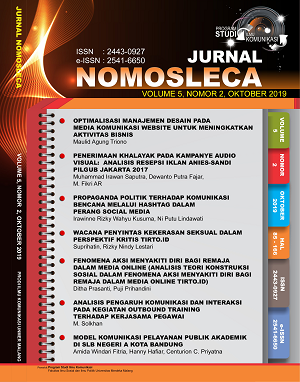FENOMENA AKSI MENYAKITI DIRI BAGI REMAJA DALAM MEDIA ONLINE TIRTO.ID ANALISIS TEORI KONSTRUKSI SOSIAL DALAM FENOMENA AKSI MENYAKITI DIRI BAGI REMAJA DALAM MEDIA ONLINE Tirto.id
DOI:
https://doi.org/10.26905/nomosleca.v5i2.3226Abstract
The act of self-injury is an action that will have fatal consequences if left unchecked to occur among teenagers today. Recently, the author saw the proliferation of mass media coverage of cases of depression which led to suicide. Anyone can experience it, especially adolescents who in fact are in a period of emotional development, so even this attracts public attention to examine the main root causes of these actions. But in this article, the author wants to highlight one of the news in Tirto.id's online media which discusses the phenomenon of self-injury for junior high school students that occurred in Riau.
In the non-participant observations carried out, the authors see that the online media Tirto.id illustrates the existence of self-injury as a form of depression experienced by junior high school students. The self-destructive actions taken were in the form of slashing one's own hand, slapping himself, hitting the wall, banging his head against the wall, and other acts of self-injury. This phenomenon is relevant to the assumptions contained in social construction theory of reality. Tirto.id said that the phenomenon of self-injury has been widespread, both through social media, videos circulating among junior high school students, that it became viral and constructed as a natural reality carried out by these teenagers, as a form of diversion from depression experienced.
Keywords: Phenomenon, Social Construction, Self-Suffering Action, Online Media, Tirto id.
Downloads
References
Bungin, B. (2008). Sosiologi KomunikasiTeori, Paradigma, dan Diskursus
Teknologi Komunikasi di
Masyarakat. Jakarta: Kencana.
Heene, Els; Buysee, Ann;& Oost Paulette,
V. (2007). An Interpersonal
Perspective on Depression: The Role
of Marital Adjustment, Conflict
Communication, Attributions, and
Attachment Within a Clinical
Sample. Family Process, 46(4).
Honeycut, Jamess M & Ford, S. G.
(2016). Mental Imagery and
Intrapersonal Communication: A
Review of Research on Imagined
Interactions (IIs) and Current
Developments. Annals of the
International Communication
Association, 25(1).
Maidah, D. (2013). SELF INJURY PADA
MAHASISWA (STUDI KASUS
PADA MAHASISWA PELAKU
SELF INJURY). Developmental and
Clinical Phsycology, 2(1).
Nazir.Mohammad, P. . (2011). Metode
Penelitian. Jakarta: Ghalia Indonesia.
Nixon, Mark; Cloutier, Paula;&
Aggarwal, S. (2002). Affect
Regulation and Addictive Aspects of
Repetitive Self-Injury in Hospitalized
Adolescents. Journal of American
Academy of Child & Adolescent
Phsychiatry, 41(11).
Putri, A. W. (2018). Mengiris Tangan,
Sakiti Diri: Bisa Jadi Anak Depresi.
Retrieved from
https://tirto.id/mengiris-tangan-sakitidiri-bisa-jadi-anak-depresi-c8KH
Sukidin, B. dan. (2002). Metode
Penelitian Perspektif Mikro:
Grounded theory, Fenomenologi,
Etnometodologi, Etnografi,
Dramaturgi, Interaksi Simbolik,
Hermeneutik, Konstruksi Sosial,
Analisis Wacana, dan Metodologi
Refleksi. Surabaya: Insan Cendekia.
Wedig, Michelle M;Nock, M. K. (2007).
Parental Expressed Emotion and
Adolescent Self-Injury. Journal of
American Academy of Child &
Adolescent Phsychiatry, 46(9).
Yu, Shuli, D. (2006). YOUTH AND
PARENTAL PERCEPTIONS OF
PARENTAL MONITORING AND
PARENT-ADOLESCENT
COMMUNICATION, YOUTH
DEPRESSION, AND YOUTH RISK
BEHAVIORS. Social Behaviour and
Personality, 34(10).
Downloads
Additional Files
Published
Issue
Section
License

This work is licensed under a Creative Commons Attribution-ShareAlike 4.0 International License.





